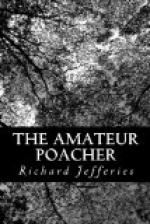Then a hare slipped out and ran the gauntlet, and filled the hollow with his cries when the shot broke his hindquarters, till the dog had him. Jays came in couples, and green woodpeckers singly: the magpies cunningly flew aside instead of straight ahead; they never could do anything straightforward. A stoat peeped out, but went back directly when a rabbit whose retreat had been cut off bolted over his most insidious enemy. Every now and then Dickon’s shot when he fired high cut the twigs out of the ash by me. Then came the distant noise of the beaters’ sticks, and the pheasants, at last thoroughly disturbed, flew out in twos and threes at a time. Now the firing grew fierce, and the roll of the volleys ceaseless. It was impossible to jam the cartridges fast enough in the breech.
A subtle flavour of sulphur filled the mouth, and the lips became dry. Sunshine and gleaming leaves and sky and grass seemed to all disappear in the fever of the moment. The gun burned the hands, all blackened by the powder; the metal got hotter and hotter; the sward was poached and trampled and dotted with cases; shot hissed through the air and pattered in showers on the opposite plantation; the eyes, bleared and bloodshot with the smoke, could scarce see to point the tube. Pheasants fell, and no one heeded; pheasants escaped, and none noticed it; pheasants were but just winged and ran wounded into the distant hedges; pheasants were blown out of all living shape and could hardly be gathered up. Not a word spoken: a breathless haste to load and blaze; a storm of shot and smoke and slaughter.
CHAPTER VII
OBY AND HIS SYSTEM: THE MOUCHER’S CALENDAR
One dark night, as I was walking on a lonely road, I kicked against something, and but just saved myself from a fall. It was an intoxicated man lying at full length. As a rule, it is best to let such people alone; but it occurred to me that the mail-cart was due; with two horses harnessed tandem-fashion, and travelling at full speed, the mail would probably go over him. So I seized the fellow by the collar and dragged him out of the way. Then he sat up, and asked in a very threatening tone who I was. I mentioned my name: he grunted, and fell back on the turf, where I left him.
The incident passed out of my mind, when one afternoon a labourer called, asking for me in a mysterious manner, and refusing to communicate his business to any one else. When admitted, he produced a couple of cock pheasants from under his coat, the tail feathers much crumpled, but otherwise in fine condition. These he placed on the table, remarking, ‘I ain’t forgot as you drawed I out of the raud thuck night.’ I made him understand that such presents were too embarrassing; but he seemed anxious to do ‘summat,’ so I asked him to find me a few ferns and rare plants.
This he did from time to time; and thus a species of acquaintanceship grew up, and I learned all about him. He was always called ‘Oby’ (i.e. Obadiah), and was the most determined poacher of a neighbouring district—a notorious fighting man—hardened against shame, an Ishmaelite openly contemning authority and yet not insensible to kindness. I give his history in his own language—softening only the pronunciation, that would otherwise be unintelligible.




